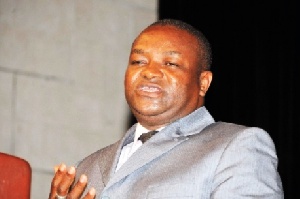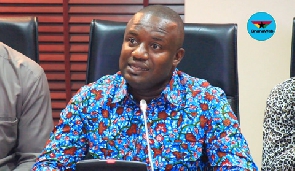Corruption will be a felony rather than a misdemeanor in Ghana should the All People’s Party (APC) win the 7 December polls, flag bearer Hassan Ayariga has promised.
At the launch of his party’s 2016 manifesto in Accra on Thursday, 6 October, Mr Ayariga said a future APC government will amend the relevant sections of the Criminal and Other Offences Act (1960) Act 29, particularly sections 239 – 257, to make corruption a felony rather than a misdemeanor.
Felonies carry harsher custodial punishment that misdemeanors.
The amendment, Mr Ayariga said, will be one of his major steps toward fighting corruption should he win the elections.
Apart from that, he said his office will also establish an independent anti-corruption agency to investigate and prosecute certain categories of cases and allegations of corruption and other criminal wrongdoing, including those involving alleged violations of the Public Procurement Act and cases implicating political officeholders and politicians.
Further, Mr Ayariga said a future APC government will foster a working environment for asset declaration that includes effective monitoring of assets declared by amending the law to require the Auditor General to periodically publish the list of all persons so required under Chapter 24 of the Constitution, who have declared or defaulted, and establishing a sanctions regime for non-declaration within the stipulated timeframe, which will include forfeiture of appointment, in the case of political appointees.
He also plans reforming the laws to set time limitations within which an appointing authority must fill any vacancy or confirm a person acting in that office, especially if it has a watchdog role.
The APC said it will also undertake the following measures as part of efforts to fight corruption:
? Introduce legislation to improve prevention, detection, reporting, investigations and prosecution;
? Adopt legislative measures that will operationalise the relevant articles on corruption in the UN Convention Against Corruption;
? Establish a publicly accessible Beneficial Ownership Disclosure (BDO) Directory in Ghana;
? Establish the Office of the Special Prosecutor.
? Strengthen institutions such as Parliament, CHRAJ, EOCO, Audit Service, Ghana Revenue Authority, Parliament, Judicial Service, Financial Intelligence Centre, Ghana Police Service and the Attorney-General’s Department and resource them sufficiently to be effective;
? Ensure the strict enforcement of the existing Procurement Laws;
? Establish a transaction price database which will be periodically reviewed to conform to market trends;
? Resource the Auditor General’s Office to set up a Procurement Audit Unit to deal with procurement;
? Establish a Forensic Audit Unit (FAU) with the Ghana Audit Service to conduct value for money audits with the view to detecting and prosecuting corrupt practices;
? Ensure the implementation of Audit and Parliamentary Accounts Committee recommendation;
? Bringing to an end the prevailing regime of impunity where people found to have stolen or fraudulently benefited from public funds are merely requested by the Attorney General to refund same on their own terms;
? Resource the NCCE to provide public education and sensitisation on the negative effects of corruption as well as initiate and sustain a national conversation on the values that should shape Ghana’s transformation as a country. This should strengthen the citizens’ resolve to resist, condemn and report corruption and demand accountability, and
? Sponsor the establishment of an interactive website for public reporting of corrupt practices in accordance with the Whistle Blower’s Act.
Politics of Thursday, 6 October 2016
Source: classfmonline.com

















